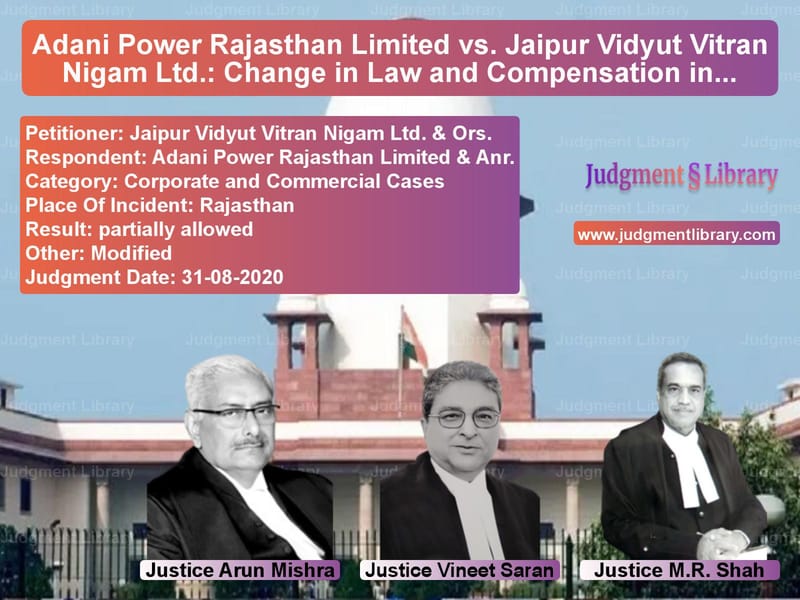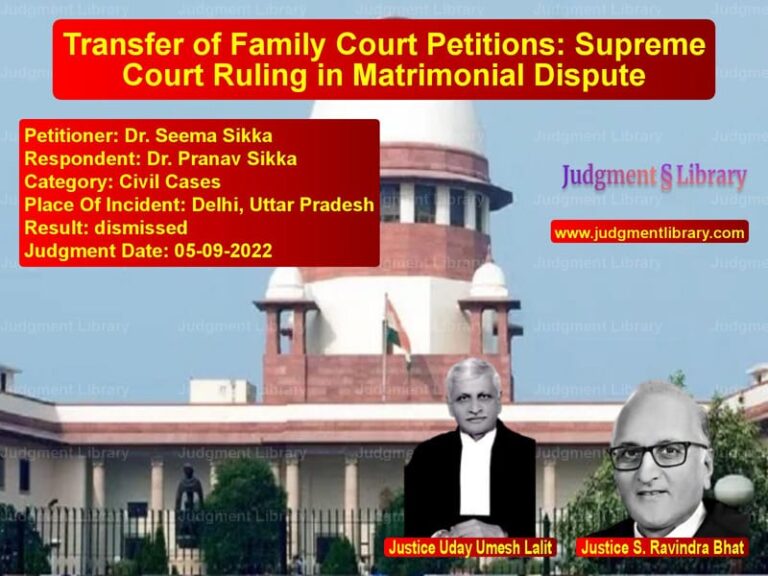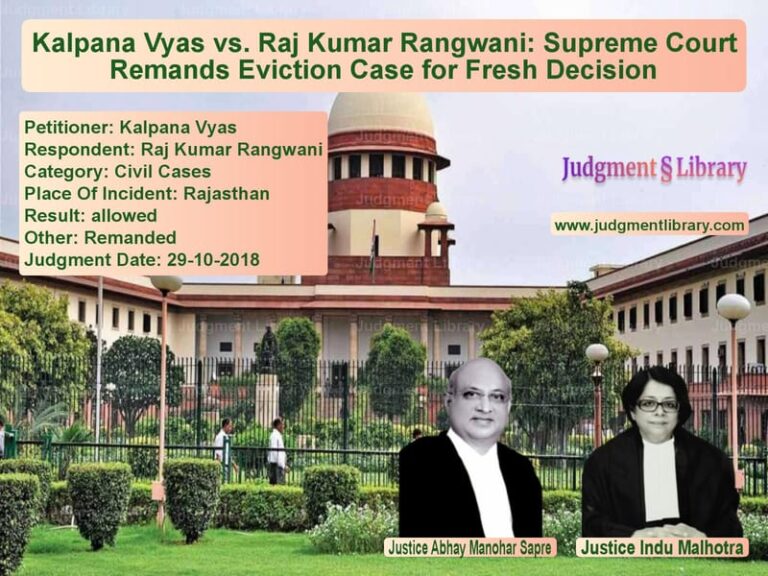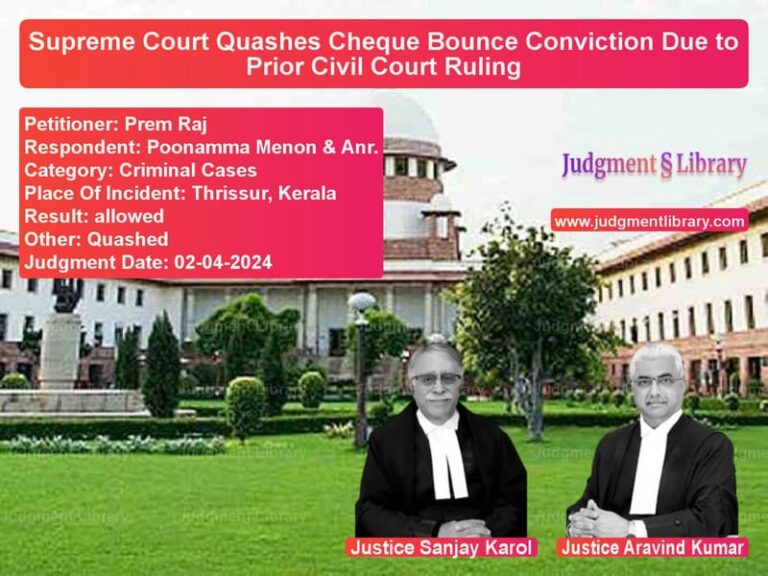Adani Power Rajasthan Limited vs. Jaipur Vidyut Vitran Nigam Ltd.: Change in Law and Compensation in Power Purchase Agreements
The Supreme Court of India recently delivered a crucial judgment in the case of Jaipur Vidyut Vitran Nigam Ltd. & Ors. vs. Adani Power Rajasthan Limited & Anr., addressing the implications of ‘change in law’ clauses in Power Purchase Agreements (PPA). This case highlights the contractual obligations of power generators and procurers, particularly concerning coal supply agreements and cost escalation due to regulatory changes.
Jaipur Vidyut Vitran Nigam Ltd. (JVVL), the electricity distribution licensee in Rajasthan, had entered into a PPA on January 28, 2010, with Adani Power Rajasthan Limited (APRL), a power-generating company. The agreement was based on a tariff determined through a competitive bidding process under Section 63 of the Electricity Act, 2003. The dispute arose when APRL claimed increased tariff compensation under the ‘change in law’ provisions due to modifications in coal supply policies.
Background of the Case
The foundation of this case lies in APRL’s contractual obligation to supply power to Rajasthan Discoms under the PPA, where the tariff was primarily based on domestic coal supply. However, due to policy changes, APRL faced difficulties in obtaining coal linkage, necessitating the use of imported coal at a higher cost.
In 2013, the Government of India revised its coal allocation policy (New Coal Distribution Policy 2013), affecting APRL’s ability to procure coal at previously agreed terms. As a result, APRL invoked the ‘change in law’ clause in the PPA, seeking compensation for the increased costs incurred due to this regulatory shift.
Petitioner’s Arguments
The Jaipur Vidyut Vitran Nigam Ltd. (JVVL) and other Rajasthan Discoms presented the following arguments:
- APRL had agreed to supply power at a fixed tariff under the PPA, and its bid was inclusive of any possible cost variations in coal procurement.
- The ‘change in law’ clause should not be applicable as APRL had agreed to meet coal requirements through either domestic or imported coal as a fallback option.
- There was no explicit provision in the PPA allowing compensation for using imported coal instead of domestic coal.
- Even if a ‘change in law’ event was recognized, APRL was not entitled to compensation for 100% of its coal requirements but only for the shortfall in domestic coal supply.
Respondent’s Arguments
Adani Power Rajasthan Ltd. (APRL) countered with the following arguments:
- The bid submitted by APRL was based on domestic coal, and the policy changes in coal allocation amounted to a ‘change in law’ under Article 10 of the PPA.
- APRL had relied on coal linkage from the New Coal Distribution Policy of 2007, which was later revised in 2013, significantly affecting coal supply.
- The Supreme Court’s ruling in Energy Watchdog v. CERC set a precedent that changes in domestic coal allocation policies constitute a ‘change in law’ and entitled the affected party to compensation.
- Rajasthan Discoms had earlier admitted that APRL was facing coal shortages due to policy shifts, and compensation should be granted accordingly.
Supreme Court’s Judgment
The Supreme Court ruled in favor of APRL, affirming that the New Coal Distribution Policy (NCDP) 2013 constituted a ‘change in law’ event. The court noted that:
- The PPA was premised on domestic coal availability, and APRL had applied for coal linkage as per the prevailing policy.
- When the coal allocation policy was revised, APRL suffered financial burdens that should be compensated under the ‘change in law’ provision.
- The compensation mechanism should restore APRL to its original economic position as if the policy change had not occurred.
- The late payment surcharge imposed on Rajasthan Discoms should be modified, reducing the interest rate to a maximum of 9% per annum instead of 2% above the State Bank of India’s base rate.
Key Takeaways from the Judgment
- Interpretation of ‘Change in Law’: The ruling clarifies that a revision in government policies affecting the cost structure of a PPA qualifies as a ‘change in law’ and mandates compensation.
- Restitution Principle: The Supreme Court emphasized the principle of restitution, ensuring that the affected party is restored to its financial position before the regulatory change.
- Binding Nature of Competitive Bidding Tariffs: The court acknowledged the need for stable electricity tariffs but held that changes in statutory policies warrant compensation adjustments.
- Limiting Late Payment Surcharge: The court reduced the interest payable by Rajasthan Discoms to APRL, ensuring fair treatment for all stakeholders.
Conclusion
This landmark judgment reinforces the importance of clearly defining ‘change in law’ provisions in PPAs and ensures that power producers are not financially burdened by unforeseen policy changes. It sets a precedent for future disputes involving government policy changes affecting contractual obligations in the energy sector.
As India continues to navigate energy policy reforms, this ruling provides much-needed clarity for power sector players on risk allocation and compensation mechanisms in long-term power contracts.
Petitioner Name: Jaipur Vidyut Vitran Nigam Ltd. & Ors..Respondent Name: Adani Power Rajasthan Limited & Anr..Judgment By: Justice Arun Mishra, Justice Vineet Saran, Justice M.R. Shah.Place Of Incident: Rajasthan.Judgment Date: 31-08-2020.
Don’t miss out on the full details! Download the complete judgment in PDF format below and gain valuable insights instantly!
Download Judgment: Jaipur Vidyut Vitran vs Adani Power Rajastha Supreme Court of India Judgment Dated 31-08-2020.pdf
Direct Downlaod Judgment: Direct downlaod this Judgment
See all petitions in Company Law
See all petitions in unfair trade practices
See all petitions in Corporate Compliance
See all petitions in Mergers and Acquisitions
See all petitions in Judgment by Arun Mishra
See all petitions in Judgment by Vineet Saran
See all petitions in Judgment by Mukeshkumar Rasikbhai Shah
See all petitions in partially allowed
See all petitions in Modified
See all petitions in supreme court of India judgments August 2020
See all petitions in 2020 judgments
See all posts in Corporate and Commercial Cases Category
See all allowed petitions in Corporate and Commercial Cases Category
See all Dismissed petitions in Corporate and Commercial Cases Category
See all partially allowed petitions in Corporate and Commercial Cases Category







